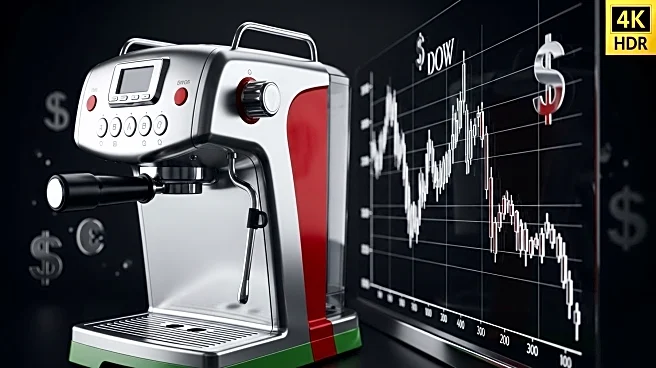What's Happening?
The Dow Jones Industrial Average experienced a decline of 0.4% following a record high closing last Friday. This downturn comes amid significant corporate developments, including Keurig Dr Pepper's announcement of its plan to acquire JDE Peet's, a Netherlands-based coffee company, for approximately $18 billion. The acquisition will lead to the separation of Keurig Dr Pepper's coffee and beverage businesses into two distinct entities, effectively reversing the 2018 merger between Keurig and Dr Pepper. Analysts have expressed concerns about the increased debt levels resulting from this acquisition, impacting Keurig Dr Pepper's credit outlook.
Why It's Important?
The acquisition by Keurig Dr Pepper is poised to reshape the beverage industry by creating two specialized companies, potentially enhancing their market focus and growth strategies. However, the financial implications, including increased debt and a negative credit outlook, could pose challenges for the company. The stock market's reaction, with Keurig Dr Pepper shares dropping significantly, reflects investor apprehension about the deal's impact on the company's financial health. This development also highlights broader market volatility, as major indices like the Dow Jones respond to corporate news and economic signals.
What's Next?
Keurig Dr Pepper's acquisition is expected to close in the first half of 2026, with the company planning to spin off its coffee and beverage businesses. This strategic move will require careful management to ensure successful integration and separation, while addressing the financial challenges posed by increased debt. Market analysts and investors will closely monitor the company's performance and strategic execution in the coming months, as well as any potential regulatory hurdles related to the acquisition.
Beyond the Headlines
The acquisition and subsequent business separation could lead to shifts in the competitive landscape of the beverage industry, with potential implications for pricing, market share, and consumer preferences. Additionally, the unwinding of the 2018 merger reflects broader trends in corporate restructuring and strategic realignment, as companies seek to optimize their operations and focus on core competencies.










